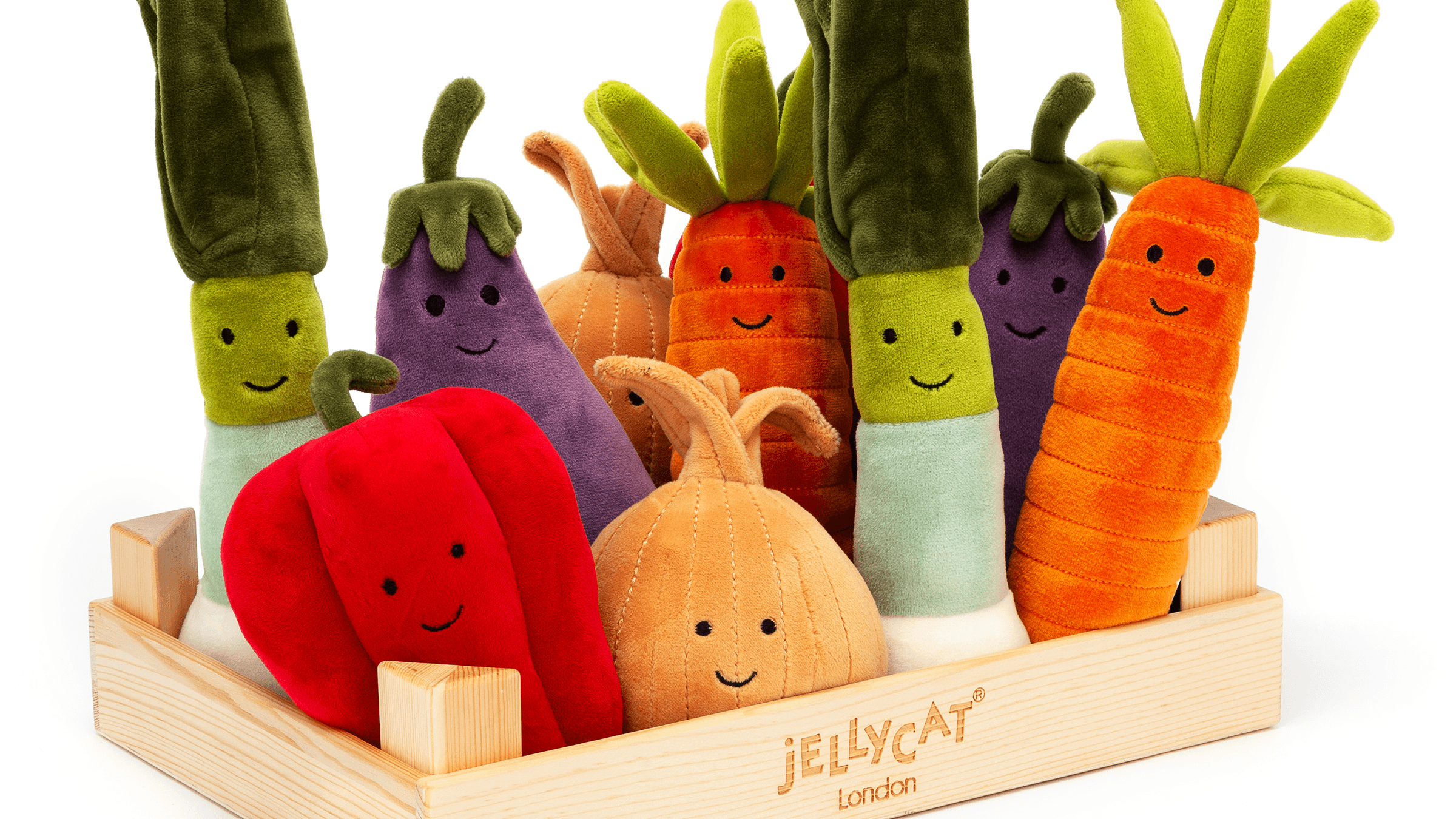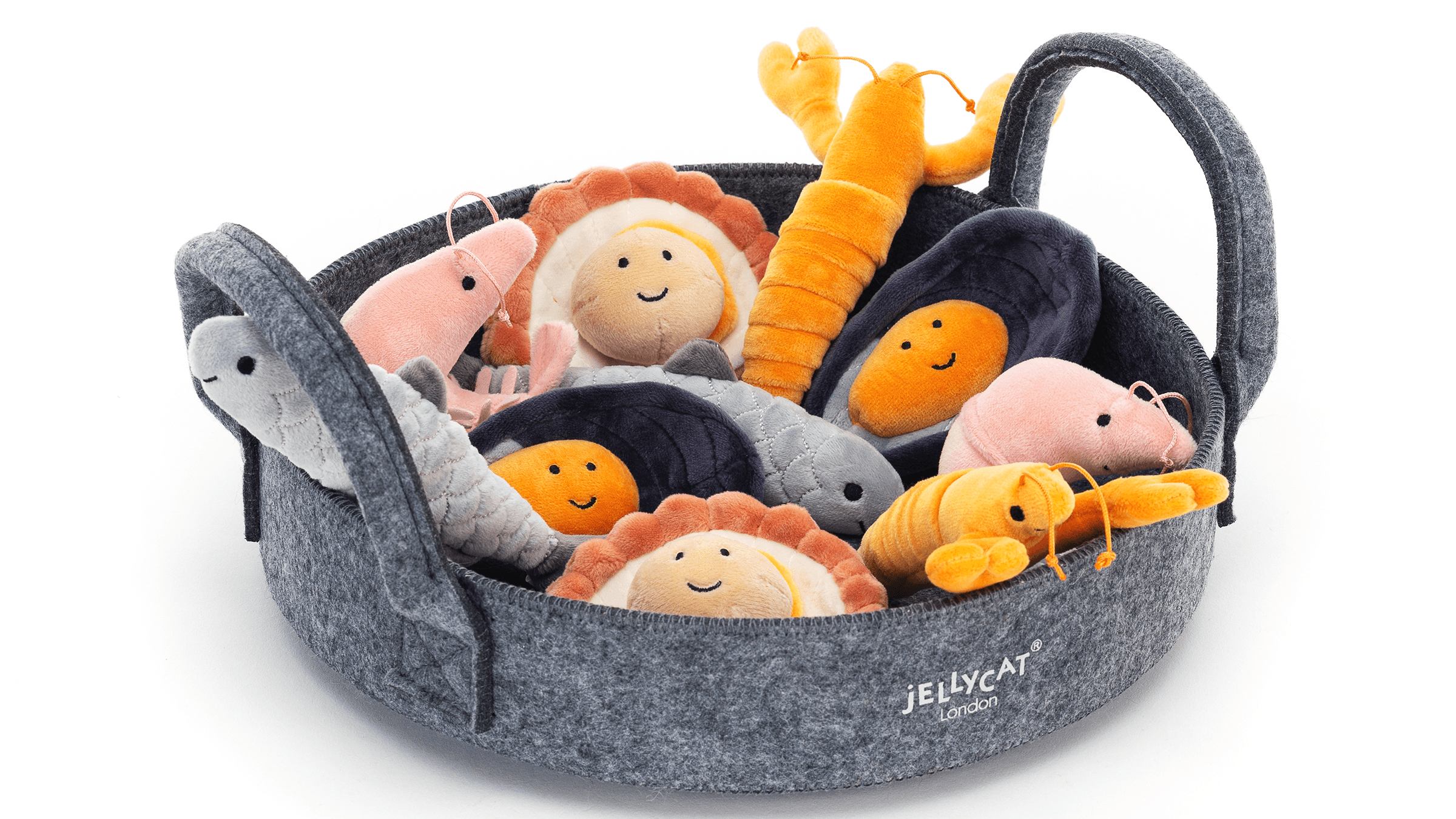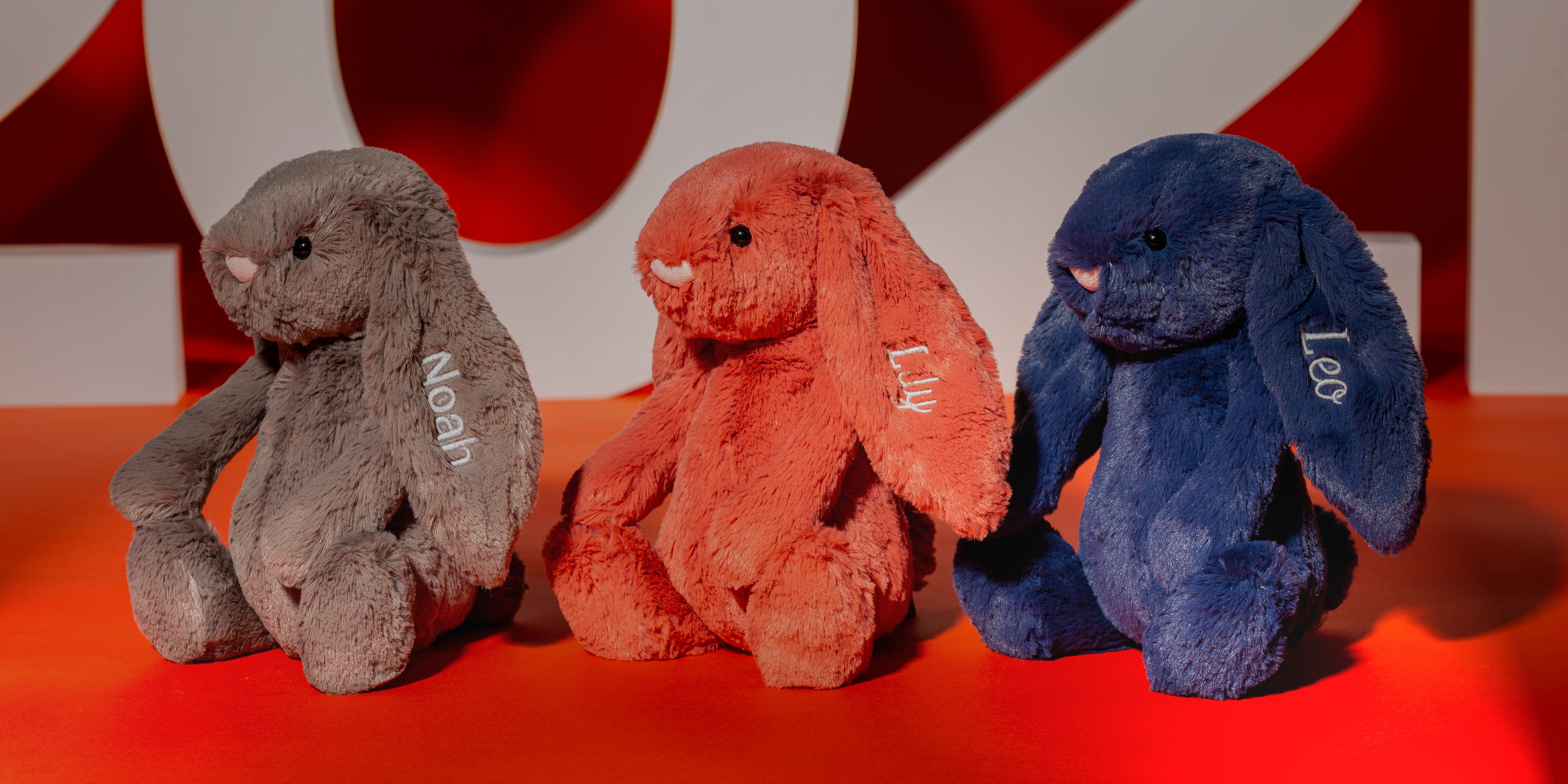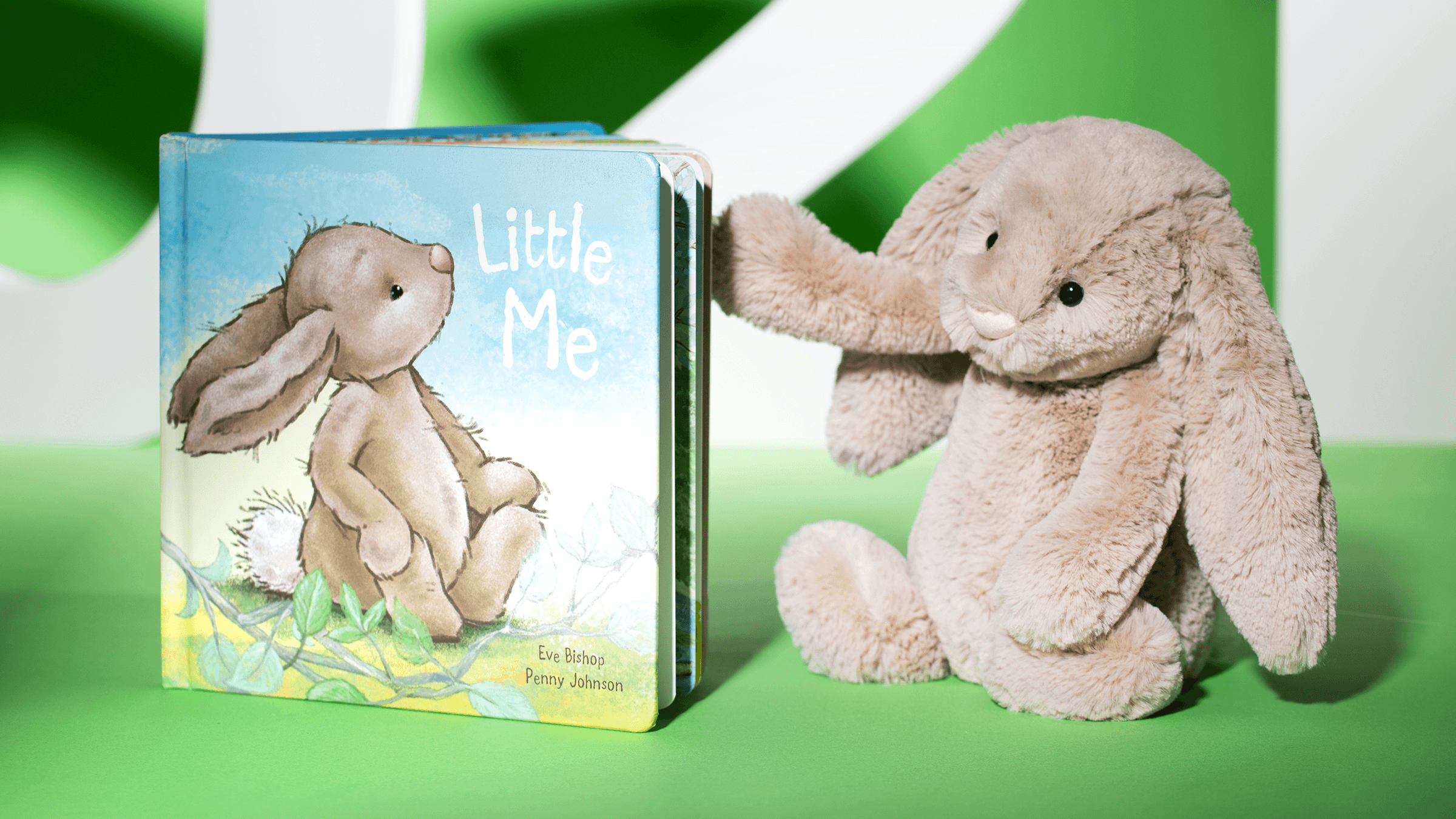There are some brands which effortlessly capture your attention and seep into your consciousness without you even knowing. Jellycat, the soft toys and gifts business co-founded by brothers Thomas and William Gatacre, is one such brand. The company has reimagined the soft toys category, creating beautiful products that are bought and cherished by customers of all ages.
“What we’re trying to do,” William told me when I caught up with him last week, “is be uplifting.” William is managing director at Jellycat, and fizzes with enthusiasm for the brand as he tells me its story.
“Sometimes you look at a space and you think: that needs a serious refresh. That was the case with the toys market twenty years ago. It felt tired, bare, and a little bit taxidermy.” And so, in 1999, Jellycat was born, named after a suggestion from Thomas’ seven-year-old son. Despite its humble beginnings – a small stall at a trade show – the brand quickly proved popular.
“We seemed to get a loyal customer base quite early on,” William told me, “and then what felt like great victories began – deals with John Lewis, Paul Smith, Selfridges, The Conran Shop, Collette in Paris. They were little moments of joy… not huge projects commercially, but very exciting.”

William reminisces about the early days at Jellycat: the thrill of securing a listing, the excitement of seeing the products in stores and being invited to Paris to meet Zadig & Voltaire founder Thierry Gillier, whose daughter was a fan of Jellycat’s toys. “We certainly got lucky… but I also think we took opportunities when we saw them. There’s a truth to the motto that you make your own luck.”
“We certainly got lucky… but I also think we took opportunities when we saw them. There’s a truth to the motto that you make your own luck.”
Lots has changed in twenty years, but Jellycat has remained true to its founding principle: produce beautiful things, and people will buy them. Taking inspiration from the art, fashion and design worlds, the company operates a seasonal model, bringing out over 200 new items every January and July. This strategy has made their products highly coveted. In fact, from reading the many online Jellycat fan forums, it wouldn’t be inaccurate to suggest that an interest in the brand’s products borders on obsession for some. As a result, the resale market for the brand is huge, with discontinued items often selling for many times their original retail price.
“The magic is in the product, so everything comes down to the design,” William explained to me. “We try not to consider possible limitations so not to restrict our imagination. There’s also nothing that shouldn’t influence our designs: art, books, music, architecture. We spend our time watching the world. Is it going urban, or is it going Laura Ashley? Whichever way it’s going, that’s where we’ll be. We have to be constantly moving and evolving with the times.”
“There’s nothing that shouldn’t influence our designs: art, books, music, architecture. We spend our time watching the world. Is it going urban, or is it going Laura Ashley?”
Thomas and William’s relentless focus on concept and design has led to a brand which appeals to all ages, and which boasts a truly unique collection of beautiful toys and gifts. Indeed, one of Jellycat’s greatest feats has been to sell as much product to young adults as they do gifts for babies and children. William reels off some of his favourites: the bestselling Bashful Bunny; the smiling piece of brie cheese complete with arms and legs; the snow dragon, and even a cuddly dish of fruit de mer – perfect for livening up a Zoom background!

“With each collection we take a leap of faith,” he told me. “We don’t hold focus groups, we just go with our gut. Luckily, we’re almost always right… there’s no better feeling than making something you love and watching it sell!
“When it comes to design,” he continued, “the only thing that absolutely doesn’t influence us is what other soft toy companies are doing. We have to ignore our competition because if we’re watching them, we’re already too late. That’s one of our central principles as a company: we shouldn’t do something just because someone else is doing it.”
This idea has driven much of Jellycat’s success, and also informed the business’ strategy to steer clear of mainstream marketing avenues. Unlike its competitors – and, indeed, its customers – Jellycat does not have any social media channels, which seems almost unthinkable for such an Instagrammable product range. “There’s something wonderful about being discovered on an individual basis,” William says, “and we like to let the products speak for themselves. Social media is something we’re looking into, but we want people to buy from Jellycat because they want to, not because they’re being told to.”
All this isn’t to say that the brand doesn’t have an online presence. In fact, it’s quite the opposite: Jellycat has a very healthy global ecommerce business and has gained significant online exposure over the years from bloggers, influencers, celebrities and even royalty who love and fervently recommend the brand because they genuinely love it, not because they were paid to do so.
“It’s been a hell of a ride,” William laughed, reflecting on the Jellycat journey. “If you’d asked me 20 years ago whether it was possible, I’d have said you must be joking!” But today, the brand employs 120 people, has offices in the UK and the US, trades all over the world and has ambitions to hit £100m in revenue in the next few years – a far cry from their roots as a small stall at a trade show.
“As we grow, we’ve adapted to retain all the good parts of a small business,” William told me. “We’re very agile – if we don’t like the path we’re on, we turn around! But we also question everything we do, so we don’t take risks unless we know we’re in a position to deal with the possible fallout. And we’re patiently ambitious: we are always happy to forgo short-term gain in favour of long-term outcomes, even if it means our revenue is reduced in the short term.”

Inevitably, it all comes back to the product. “We don’t chase revenue – we chase the best possible design and the best possible service, with the hope that the revenue follows.”
Jellycat has stuck fast to this approach, even during times of great commercial uncertainty, such as the 2007/8 financial crash, Brexit, and most recently Covid-19. “In 2007, we took a conscious decision not to downgrade our products, but instead to provide stability. Customers looked to us for comfort and consistency – and they’re doing the same now.”
“Customers looked to us for comfort and consistency – and they’re doing the same now.”
I wonder, what’s next for Jellycat? “Sustainability has to be a big part of our future,” William tells me, “not just from a commercial perspective but because it’s the right thing to do. But we’re taking it step-by-step – starting small like making changes in our warehouses, and then looking into recycled fabrics and recycled labels. We’re on the path and we’re taking it seriously, but it has to be incremental steps towards something bigger.”
William’s passion for the brand is infectious, and it’s clear that the joyful products are a reflection of the happy culture that exists internally at Jellycat. “I truly believe that we should treat our employees, customers and suppliers decently respectfully and fairly,” William tells me. “It is the right thing to do – ethically and morally – but it’s also good for business. If we can do that, and at the same time make money, then I sleep well at night.”
As our conversation draws to a close, I can’t help but reflect on what William had said about luck. Certainly, Jellycat came into the world at just the right time. However, the brand’s success cannot be put down to luck – but to taking opportunities and building a value-based company with original design at its heart.
Quick-fire questions
Born? In West Africa, but moved to the UK when I was five or six.
Mentor? I like taking lots of different things from different people. But someone I look up to – more for their way of thinking than as a business mentor – is Alan Fletcher, who is one of the great British designers. I very often find myself going back to his quotes to find solutions, both design-wise and about how to run a company.
Legacy? I’d just like to think we’ve amused and entertained people, and that we’ve made beautiful things that people will remember.








